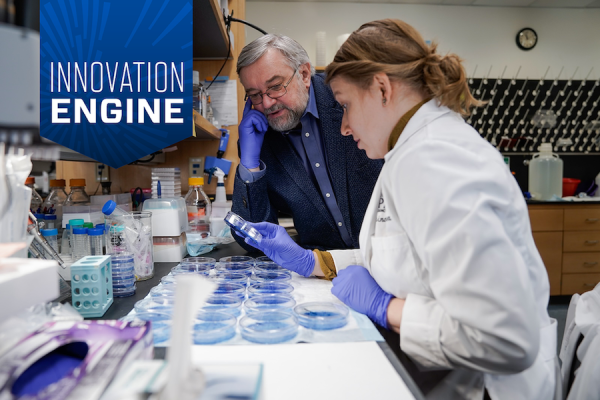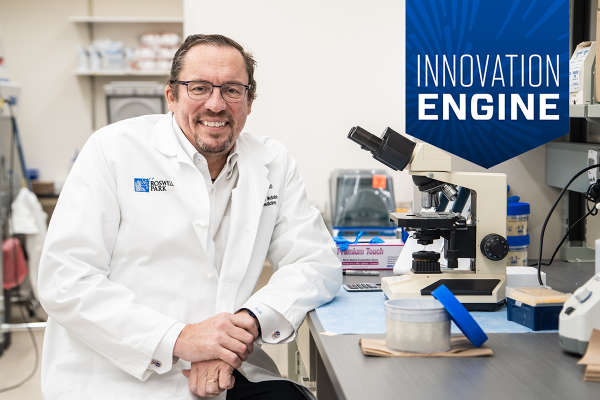Roswell Park expert led team that linked BRCA genes to multiple myeloma
The Innovation Engine series highlights high-impact Roswell Park science that advances the priorities of the National Cancer Plan — a roadmap for working together to end cancer as we know it. The work outlined in this post supports Goal #5: Deliver Optimal Care.
For more than three decades, cancer researchers have known that the risk of breast cancer is higher in people with inherited mutations, or differences, in two specific genes. They’re called BReast CAncer1 and BReast CAncer2 — shortened to BRCA1 and BRCA2. When they work properly, those genes — two of the genes known as tumor suppressors — put the brakes on cancer by repairing damaged DNA and keeping cells from growing out of control. But mutations passed along from parent to child can cause them to malfunction, allowing tumors to form.
BRCA genes involved in several cancer types
Everyone inherits one copy of BRCA1 and one copy of BRCA2 from each parent. An inherited mutation, known as a pathogenic germline variant (PGV), in just one of those copies raises the risk of developing breast cancer. Over the years, research has shown these BRCA mutations also increase the risk for several other cancers, including ovarian, pancreatic and prostate.
Now a landmark genetic study led by Kenan Onel, MD, PhD, Chief of Clinical Genomics and Director of the Center for Precision Oncology and Cancer Prevention at Roswell Park Comprehensive Cancer Center, has found that up to 10% of multiple myeloma patients have PGVs in their BRCA genes, dramatically increasing their chances of developing the disease, which is a type of blood cancer that affects plasma cells. While multiple myeloma affects mostly older adults — 95% of patients are over 50 — Dr. Onel and his colleagues found that patients whose BRCA genes contained PGVs were more likely to be diagnosed at a younger age and to have a personal or family history of cancer.
DNA points the way to chemotherapy plus stem cell transplant
The study also suggests that genetic testing for young or newly diagnosed multiple myeloma patients could help identify the most promising treatment option for them. They found that patients with PGVs were more likely than others to benefit from therapy that included the chemotherapy drug melphalan (brand name Alkeran) in combination with the only multiple myeloma treatment that can result in a cure — autologous stem cell transplant. They added that genetic testing should be considered for young or newly diagnosed multiple myeloma patients who have a personal or family cancer history, to guide treatment decisions and alert their family members to their own potential risk.
“Increasingly we’re seeing that inherited risk of cancer is important to consider when it comes to identifying the best cancer treatment,” says Dr. Onel. “This expands the treatment options we have for these patients.”
Multiple myeloma is a rare disease, but Dr. Onel and his colleagues were fortunate to have access to the two largest multiple myeloma databanks in the world — the CoMMpass Study of the Multiple Myeloma Research Foundation and another at Tisch Cancer Institute at Mount Sinai in New York City — which provided information about tumors, treatments and post-treatment outcomes for 1,681 patients. The collaborative effort involved researchers from the Icahn School of Medicine at Mount Sinai, New York; the Tisch Cancer Institute at Mount Sinai; and the biotechnology research company Sema4 in Stamford, Connecticut.
Dr. Onel heads Roswell Park’s new Department of Clinical Genomics, the first of its kind in the nation focusing on diagnosing and caring for patients whose genetics or family history increase their risk of cancer.
“This study highlights yet again how important genetics is to the diagnosis, treatment and prognosis of cancer,” he says.
The Roswell Difference
Pioneering innovation like this is part of what makes Roswell Park an "Exceptional" comprehensive cancer center, designated by the National Cancer Institute.




